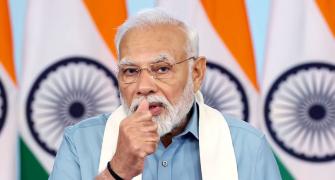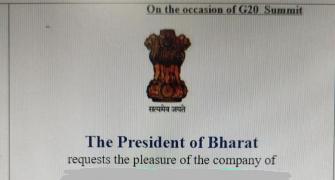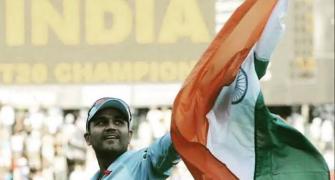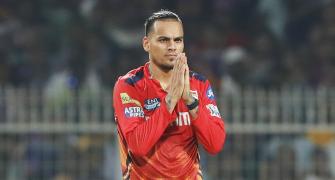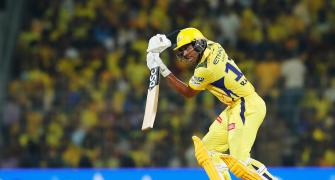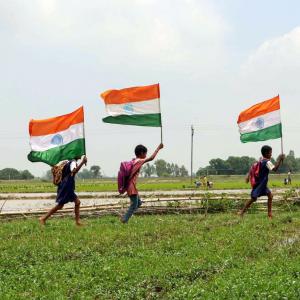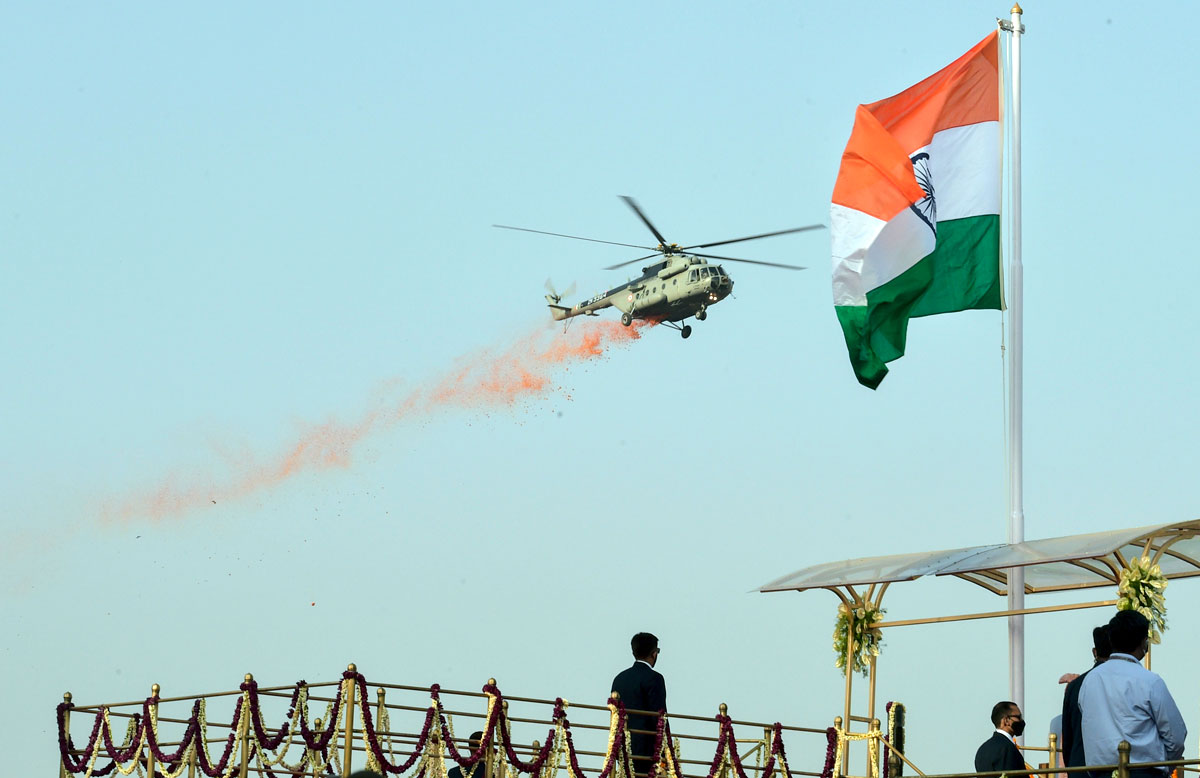By changing the nation's name from India to Bharat, would this landmass overnight lose the emotional and cultural linkage that had been built over generations, centuries and millennia, asks N Sathiya Moorthy.

If someone thought that India's G-20 chair will be remembered as one for the Global South, if not a conclusive step on the Ukraine war, it may not be so.
Both inside the country and outside, it will be remembered for the dinner invitation that has gone out from the 'President of Bharat'.
Alongside, the government also referred to Prime Minister Narendra D Modi as the 'Prime Minister of Bharat' in reference to the ASEAN-India (not yet Bharat) Summit and the East Asia Summit, both at Jakarta, Indonesia.
The new initiative, if it is one -- and will be known when Parliament meets later this month -- coupled with an equally unanticipated move over the immanency of a new bill to ensure one nation, one election (ONOE), can be a momentous experiences for the nation, more than at any time in the post-Independence past.
In comparison, the Modi government's midnight Parliament session on GST implementation, if only to erase memories of Jawaharlal Nehru's 'stroke of the midnight hour' session way back on 15 August 1947, pales into insignificance and less.
Yes, 'India that is Bharat' is the name that the nation gave itself at the formation of the Republic, and the Constitution's very first Article begins thus: 'India that is Bharat is a Union of States.'
The Constitution has also empowered Parliament to change the name and boundaries of states under the Union, through a resolution passed by a simple majority. No constitutional amendment was/is required.
This has happened many times over since the Constitution came into force in 1950. As coincidence would have it, Madras was the first state to be bifurcated (to create a new one, Andhra Pradesh) in 1953 and renamed as Tamil Nadu (1969).
It is anybody's guess if the BJP-ruled Centre would also attempt changing the name of the capital from New Delhi to Indraprastha, as known in the Mahabharat, or by its original name Kandavaprastha, before the Pandavas entered the city.
If so, can Parliament do it, or should the Delhi assembly too need to pass a resolution?
On the nation's name-change, neither Chapter I of the Constitution, nor any other provision of the Constitution, specifically empowers Parliament or any other authority to change the nation's name.
In this case, to be precise, it would have to be either re-prioritising the reference to 'Bharat that is India', or drop all mention of 'India', as a vocal section of the ruling BJP's Hindutva brigade has been desiring for long.
Their idea is to end all vestiges of a colonial past, but setting it back by centuries and millennia, as the name, owing to the river Sindhu, now Indus, dates back to the 5th century BCE.
Hindu Puranas and other literary references are as old too.

The speculation now is if the government would move Parliament on the name-change in the specially called session later this month, and if so, what methodology would (have to) be adopted.
There is the further question on what the Supreme Court would have to say, if moved, about the procedures and processes, if not the very idea of name-changing, which may not have a Constitutional reference-point to argue about.
Yet, in the course of any such argument, the point would still be made if the executive acting through the legislature would have powers to change the name of the nation, as it desired -- and if it could be a continual process, if successive governments found pleasure in doing so.
By extension, the question will also be argued if the name of the nation forms a part of the 'Basic Structure' of the Constitution, which point the Supreme Court has been agitating through the days-long hearing on the 'J&K Reorganisation Act, 2019', which marathon hearing concluded on Tuesday, September 5, 2023.
The Supreme Court's reserved verdict in the case, when pronounced may -- or, may not -- throw some possible new light also on the emerging subject, if it becomes one.
The question is not about effecting all those administrative and documentary changes, beginning with changing the name and title of multiple laws and institutions all across -- and intimating international agencies and fellow-nations in the comity.
These are procedural issues, which could be done without much haste or difficulty in this IT era and communication.
Already, the government began with such experimentation when it introduced, unannounced, three new bills to replace colonial era legislations, namely, the Indian Penal Code, the Criminal Procedure Code and the Indian Evidence Act.
The new names, all in Hindi, begin with the phrase 'Bharatiya', an adjective flowing from the pronoun 'Bharat'.
Thus the draft bills that Home Minister Amit A Shah readily got referred to a parliamentary select committee on presentation bear the names, Bharatiya Nyaya Sanhita, Bharatiya Nagarik Suraksha Sanhita,= and Bharatiya Sakshya Bill, respectively.
At the time, criticism, though muted and restricted mostly to DMK members from Tamil Nadu, was to the Hindi titles when the 'three-language formula' was supposed to be still in vogue.
No one had then imagined that the real thing was yet on the oven...
Whatever the other consequences of a name change, if effected now or later, if it is Bharat or any other, any loss of the 'Indian' identity, even if retained in the reverse version in Article 1, then the nation would lose the unique status of having an ocean named after it.
It may be recalled that over a decade back, the Global Times, China's official English language newspaper, declared that the 'Indian Ocean is not India's Ocean'.
At the time, Pakistan had proposed that the Indian Ocean's name be changed to 'Asia-Africa Ocean'.
By changing the nation's name from India to Bharat, if at all, would this landmass overnight lose the emotional and cultural linkage that had been built over generations, centuries and millennia?
The name Bharat may pick up quick and fast, if the Government of India were to make the change, and the new-generation of Indians or 'Bharatiyas' may continue to identify it in every which way but not in an emotional way, as it is now.
Such an emotional bondage subconsciously linking India to the Indian Ocean is spread across much of Asia, be it the Gulf-Arab nations or South-East Asia, and also South and East Africa, especially.
Will breaking that emotional bonding in them for India have medium and long-term consequences for bilateral and multilateral relations, in the absence of the cultural identity that they are accustomed to, is a question for which there is no ready answer.
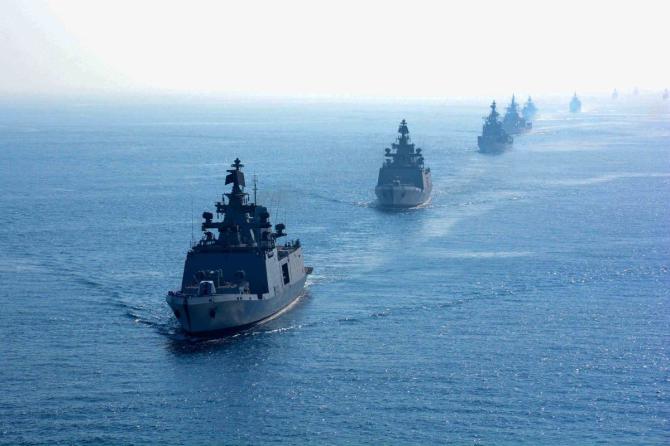
In the immediate context of contemporary geo-political and geo-strategic discourses, terms like 'Indian Ocean Region' (IOR), Indo-Pacific and institutional arrangements like IOR-A won't be readily giving into any name-change where 'Bharat' replaces 'India'.
This, of course, does not change India/Bharat's equations in those discourses and their decisions, yet the emotional linkages, especially for the Indian strategic community, will still be missing.
Even without it, who knows, Pakistan may lay claim to the name 'India', as mentioned since by a section of the nation's media, if New Delhi were to give up that name for good. That does not seem to be the case, however, at least as things stand now.
Even at the time of Partition, Pakistan's Mohammad Ali Jinnah wanted the name 'India' frozen, and names like 'Hindustan' chosen for the nation carrying the original name.
All of it will come at a time when the Chinese adversary will continue to have the South China Sea and East China Sea 'named after the nation'.
Worse still, Beijing also claims ownership of much of the South China Sea, at the very least, though outright denied by the affected nations in the region.
However, they at least are not toying with the idea of changing the names of those two seas, as China is often wont to do in the case of towns and villages that it has 'occupied'.

If this is as far as the name-change goes, the systems-change that is being sought to be introduced -- or, reportedly so -- may have changed India as is known, both in form (read: Name) and content.
As stand-alone initiatives, too, both have the potential to change the nation's future course, all at one go.
For instance, the name change may send out a message across the world about the intent of the nation's present-day rulers, going beyond what the one-sided western media may have reported all along.
Or, the perceptions such a name-change could agitate, especially in Western street opinion, which their elected governments may not be able to ignore, beyond the point, despite the commonality of purpose on a common anti-China platform.
Likewise, efforts at introducing the ONOE scheme could end up being interpreted as anti-federal, hence anti-democratic, in content though not necessarily in form.
Again the question remains if an executive with a brutal legislative majority could initiate what essentially are seen as one-sided efforts of an unchanging kind.
It is thus not about a post-poll government, now or later, changing both the name and the ONOE scheme at will.
What if in theoretical terms, this government were to lose power in elections 2024, both at the Centre and in many/most states?
Even the figment of justification now available to them may be lost. But the nation too would have lost two unparalleled historic markers.
There may then be no going back to status quo ante, especially if the BJP even as a loser still has enough numbers in either or both Houses of Parliament, and/or many states to thwart a two-thirds majority.
It all will begin with the question if the Centre should get the ONOE bill, if moved, passed not only by a two-thirds majority in both houses of Parliament, but also by half the state legislatures, for it to become law.

It is anybody's guess how and why former President Ram Nath Kovind lent his name, and that of the high office that he had held, to what is otherwise a political initiative -- or, will be seen only as such, both by the supporters and opponents of the move.
Or, why the official notification did not specify a particular time-frame as used to be customary, but seeks the panel's recommendations 'at the earliest'?
Does it imply that the panel would submit its report asap, in time for the suspenseful Parliament session, without 'adequate consultations' with various stake-holders (which in effect is almost each one of the 1.4 billion Indians, or their elected representatives of all hues and political philosophies?).
This idea at least sounds far-fetched at the moment.

There is still no denying the timing of the name-change to the Opposition parties forming the 'INDIA' alliance, and contesting each of the ruling BJP's unilateral claims to 'nationalism' and 'patriotism', as if they were alien to the rest of the nation's polity that did not fit into its scheme.
If the Opposition says that the ruling party was first upset, and now terrified by the idea of their usurping the 'INDIA' name, that too ahead of next year's Lok Sabha polls, the BJP has not convinced anyone as much as used to be the case on other matters, on other days.
Likewise, there are those who still go back to the 'Janata Party era' of the forgettable seventies, when the anti-Congress alliance of the day showed that united they could still defeat the ruling party, convincingly, and staggered elections helped them even more.
Of course, the Janata Party victory of 1977, and more so the subsequent Congress's comeback poll of 1980, gave room for hopes that a party, that too one with a tall leader, could aspire to win national elections, just by winning the 'Hindi heart-land'.
Such thinking at the time gave birth to two ideas -- either a Presidential form of government or 'simultaneous polls' to the Lok Sabha and all state assemblies, or both.
Neither was found feasible, or reliable, either by the Indira Gandhi government in 1980-1984, or the rival BJP-led NDA government of the Vajpayee-Advani duo in the late nineties.
Even today, there is nothing to suggest otherwise, more so with regard to ONOE.
Much as it may be argued that much of the anomalies that had crept into the system has been eliminated by the Supreme Court's verdict in the 'S R Bommai case' (1994), new and unforeseen situations might arise -- and could also erupt near-simultaneously in multiple states, bringing them all to a stand-still.
The nation's experience with the much-hailed anti-defection law at inception should be an eye-opener.
Likewise, the argument that simultaneous elections would cut down on government expenditure is wrong.
It is even more farcical when it is argued that owing to frequent elections, governments at the Centre especially are unable to undertake an honest job of governance, and are given to populism, year after year.
In the case of simultaneous elections, not only the ruling party at the Centre, but also those in the states are going to unveil 'populist schemes', which Modi has even recently criticised as 'freebies' and worse.
What more, for the whole year, as in the US, for instance, the entire nation will be on the 'election mode', and no policies will be rolled out, nor programmes implemented without the elections in mind.
To put it mildly, the governments at the Centre and in the states would come to a stop, for any time from six months to a year -- something that could be afforded in the fifties and the sixties of the previous century, but not in the twenties and the thirties of the 21st century.
N Sathiya Moorthy, veteran journalist and author, is a Chennai-based policy analyst and political commentator.
Feature Presentation: Ashish Narsale/Rediff.com

